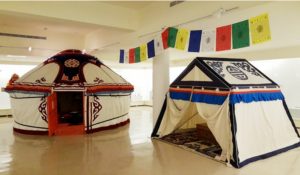
Taiwan’s Mongolia and Tibet Affairs Commission (MTAC) is to be shut down as part of a government restructure, Taiwanese officials have confirmed.
The office, responsible for the promotion of Mongolian and Tibetan culture and cultural exchange in the region, is set to be closed by submission of a Cabinet phase-out bill at the end of this month.
Some of the commission’s functions will be absorbed by the newly expanded Department of Hong Kong, Macao, Mongolia and Tibet Affairs, part of the Mainland Affairs Council (MAC), which is the primary overseer of Taiwan’s diplomatic relations with Beijing. The rest of the bureau’s responsibilities, and the majority of its staff, are to be absorbed by the Ministry of Culture and the department of Foreign Affairs.
“At present, there are 49 staff members, six of whom will be reassigned to the Mainland Affairs Council’s Department of Hong Kong and Macao Affairs, which will take a new name: the Department of Hong Kong, Macao, Mongolia and Tibet Affairs,” explained Hsu Jan-Yau, the current head of the MTAC. “The rest will go to the Culture Ministry’s new department, the Mongolian and Tibetan Cultural Centre.” he said.
Controversy has surrounded the Commission for many years, the Tibetan Review saying “The commission was previously accused of funding disaffected elements to create a division within the Tibetan community in exile” and the Tibet Post reports, “The cabinet-level MTAC, which had for long, until the early 1990s, been accused of bankrolling disgruntled groups and elements in the Tibetan community to create discord within it, now set to be dissolved or merged with another department”. The Post continues, “Taiwan’s ruling Democratic Progressive Party (DPP) was reported to have argued that it was ‘no longer necessary’ to have a commission to deal with matters relating to Mongolians and Tibetans since Mongolia was now an independent country while Tibet was seeking to gain similar status”.
The closure was originally proposed by the DPP in the early 2000s, before being shelved due to disagreement over whether the regions should be considered foreign or mainland (Chinese) nations. One former official, Commissioner Kao Su-Po, noted that the fact that only six of the MTAC’s forty-nine employees are to be moved to the MAC suggests that the government no longer considers the regions to be part of the Chinese mainland. According to the Taiwanese constitution, however, the nations are still considered to be constituents of the Republic of China.
The Post reports on concerns “that Tibetan refugees living in Taiwan have been left untreated and uncared for” but says that “Recently it appears there is hope for Tibetans living in the country, as the issue was reportedly raised in Taiwan’s parliament and many parliamentarians expressed their concern for the situation of Tibetans”.
The 472 Mongolians and 648 Tibetans resident in Taiwan who are serviced by the existing MTAC will continue to receive such support from those agencies which are taking over the MTAC’s staff and responsibilities.
Established in 1636 under the Qing Dynasty as the Mongolian Bureau, the Commission was briefly tasked with encouraging rebellion against the Chinese Communists in the occupied regions during the period following the Chinese Civil War. It later promoted Mongolian and Tibetan migration to the island, in hopes that the migrants might be an asset upon Taiwan’s eventual recapture of the mainland, before assuming its current role as cultural ambassador in the late 1970s.




 Print
Print Email
Email